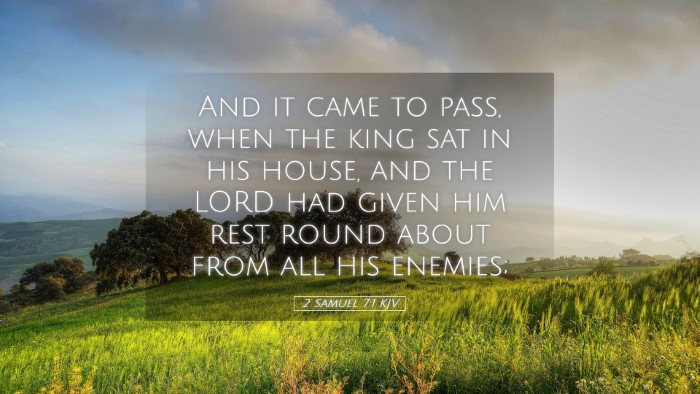Commentary on 2 Samuel 7:1
Verse: "And it came to pass, when the king sat in his house, and the LORD had given him rest round about from all his enemies." (2 Samuel 7:1)
Contextual Overview
This passage marks a significant moment in the life of King David, following his establishment as the ruler over Israel. At this point, David has achieved military success and enjoys a time of peace. Understanding the historical and theological backdrop is crucial for interpreting this verse.
Insights from Matthew Henry
Matthew Henry emphasizes the peace that God bestowed upon David, noting that rest from conflict is instrumental for spiritual reflection and for considering the plans of God. Henry draws attention to the importance of Solomon's future temple, which David desired to build. However, the verse serves as a reminder that God's presence does not reside solely in great edifices but is manifest in His people.
Insights from Albert Barnes
Albert Barnes reflects on the phrase "the LORD had given him rest". Barnes cites that peace is a divine gift and highlights the importance of this rest from enemies as a backdrop for David's intentions. The rest David experienced allowed him to contemplate building a house for the Lord, showcasing his desire to honor God after receiving blessings.
Moreover, Barnes notes that the significance of this rest points to a broader theological premise: God's covenant with His people often leads them into a state of peace and blessings, allowing them to focus on spiritual endeavors.
Insights from Adam Clarke
Adam Clarke presents a more detailed exploration of the implications of David's rest. Clarke brings to attention the surrounding geopolitical context, suggesting that David's achievements were divinely orchestrated to provide an environment conducive to growth in faith and worship. He highlights that such a time of peace prompted David to reflect on his relationship with God and his duties toward divine worship.
Clarke also points out that David’s proposed plan to build a temple reflects a heart motivated by gratitude and desire for deeper communion with God. Importantly, Clarke asserts that God’s divine presence cannot be restricted to a building, emphasizing the significance of the human heart as the true temple of God.
Theological Implications
This passage raises profound theological questions about the nature of worship and the presence of God. It challenges readers to consider where they find rest and security, reminding them that true peace comes through God’s sovereignty over their lives. As David’s reflections lead him towards the desire to build a temple, it symbolizes humanity's yearning to connect with the divine.
- Rest as a Divine Gift: The peace experienced by David is a demonstration of God’s grace and favor, encouraging believers that they, too, can find rest in Him.
- The Desire for Worship: David’s intentions highlight the importance of worship and building a culture that honors God.
- Covenant Relationship: David’s relationship with God reflects the broader theme of covenant in Scripture, showing that God desires not just to provide but also to dwell with His people.
Application for Today’s Believer
For pastors, students, theologians, and Bible scholars, this verse encourages contemplation about personal and communal worship practices. Here are some practical applications:
- Seeking Divine Rest: In a world fraught with conflict and unrest, finding peace in God’s presence should be a priority for believers.
- Intentional Worship: Like David, believers should strive to develop intentions for worship that honor God, recognizing that worship is both a personal and corporate act.
- Building God’s Kingdom: While physical temples may not be the focus today, creating spaces—whether literal or metaphorical—for God’s presence is vital in community life.
- Reflective Practice: Taking time to reflect on God’s blessings prompts gratitude and leads to informed discipleship that encourages others in their faith journey.
Conclusion
2 Samuel 7:1 encapsulates a pivotal moment in David’s life, reflecting themes of peace, worship, and God’s enduring covenant with His people. Pastors and scholars are invited to delve deeper into this text as it provides profound insights into the nature of God's interactions with His creation and encourages believers to pursue a more significant relationship with the Almighty.


